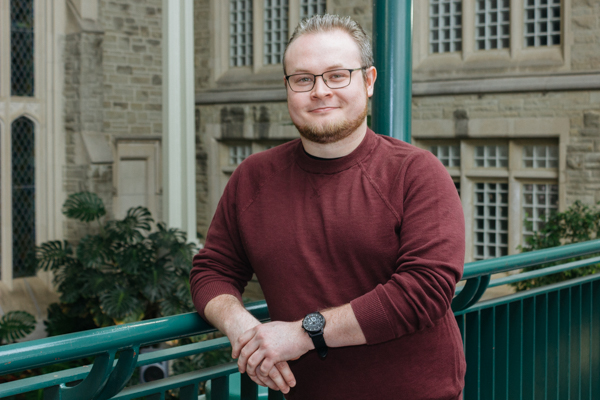Admissions
Equity, Diversity, Inclusion and Decolonization
The School of Graduate and Postdoctoral Studies is committed to equity, diversity, inclusion and decolonization in all aspects of graduate and postdoctoral studies. For more information regarding these commitments please visit grad.uwo.ca/edi-d.
Microbiology and Immunology
Doctor of Philosophy (PhD)Meet Mackenzie Dodge, PhD candidate in Microbiology and Immunology

Why did you come to Western for your graduate degree?
I chose Western for my graduate studies because I learned to love the study of microbiology and immunology while doing my undergraduate training here. I built a good rapport with the faculty in the department, so it was a natural progression for me to undertake graduate studies in the same environment. Western also has excellent researchers in the field I wanted to study, and this meant I would have a first-hand opportunity to be involved in exciting discovery-based science.
Describe your research.
My research involves studying how different viruses interact with our cells while infecting them. In particular, I look at adenoviruses, which typically cause things like the common cold and pink eye. These viruses are typically not very dangerous, and part of that is because they’ve co-evolved with us for so long that they have developed excellent strategies to hijack our cell machinery and survive inside us. So, my research looks at understanding how some of these important machinery systems in our cells can be targeted and taken over by viruses.
Do you serve on any committees?
I serve as the graduate student representative on departmental graduate education committee meetings. It is really important that my department allows student representatives on committees like this. It shows that the faculty care about how the students feel about their education and opportunities, and are willing to listen and change their procedures in response to the student’s needs and wants.
What is it about your grad program that enables you to thrive?
My graduate program puts a huge focus on presenting your research, which really improves your own understanding of your work. My department has annual seminar presentations for each student, where I can share my research project with the department, giving me practice and feedback on teaching my research area every year. There are also many opportunities to attend conferences to present my research to the greater scientific community, be it at national or international meetings. These meetings are really the best part of graduate school, because you get to travel around the world to meet with the top researchers in your field, and learn about all the most exciting discoveries going on.
Program Websites
Program Contact
mnigradstudies@uwo.caDepartment of Microbiology and Immunology
Western UniversityDental Sciences Rm 3014
London, Ontario N6A 5C1
f. 519-661-3499
Western’s Graduate Program in Microbiology and Immunology offers research-intensive, thesis-based graduate training at the Masters' and the Doctoral level. We possess world class facilities and a motivating training environment, with high profile research programs overseen by internationally distinguished faculty members. The Graduate Program of the Department of Microbiology and Immunology revolves around two major fields of scientific endeavor: i) The molecular and cellular biology of microorganisms, and ii) The molecular and cellular biology of the immune system. These fields involve studies on bacteria, virus, parasites, cancer cells, and immune cells with an emphasis on molecular biology, biochemistry, and pathogenesis.

The Own Your Future doctoral professional development program will help you become a career-ready graduate with the skills necessary to excel in your studies and achieve your future goals. By participating in the program, you will assess your own strengths and opportunities for growth, choose what skills you want to enhance during your time at Western, and learn how to articulate the skills you gained in your degree to optimize your future career opportunities. To learn more, visit www.uwo.ca/ownyourfuture.
Program Length
- 12 Terms
Program Design
- Full-time study
- Thesis-based
Funding Information
Applicants are encouraged to apply for the following scholarships (if eligible):
Tuition and Fees
Tuition and fee schedules (per term) are posted on the Office of the Registrar's website at http://www.registrar.uwo.ca/student_finances/fees_refunds/fee_schedules.html
Graduate Student Affordability Calculator
Use this helpful tool to estimate how much money you will need to pay for your tuition, fees, housing, food, and other necessities for a 12-month (three term) academic year.
Admission Requirements
- Honours Bachelor degree, or equivalent, in Microbiology, Immunology or some other biological sciences program. Holders of MD, DDS, or DVM degrees are also eligible to apply.
- Minimum high B average from the undergraduate degree.
English Language Proficiency
Applicants whose first language is not English must furnish evidence of their proficiency in the use of the English language:
Application Deadline
- February 1 - Fall Term
- July 31 (pending spots remaining) - Fall Term
- March 31 - Summer Term
Fields of Research
- Cellular and Molecular Biology of Microorganisms
- Cellular and molecular Biology of the Immune System






